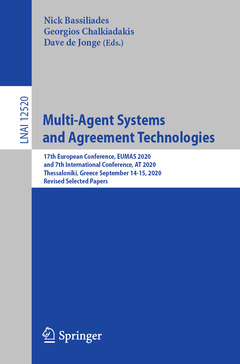Intelligent agents and MAS applications.- Towards a Theory of Intentions for Human-Robot Collaboration.- Decentralised Control of Intelligent Devices: A Healthcare Facility Study.- Decentralised Multi-Intersection Congestion Control for Connected Autonomous Vehicles.- Congestion Management for Mobility-on-Demand Schemes that use Electric Vehicles.- Disaster Response Simulation as a Testbed for Multi-Agent Systems.- Mechanisms, Incentives, Norms, Privacy.- Rewarding miners: bankruptcy situations and pooling strategies.- A Game-Theoretical Analysis of Charging Strategies for Competing Double Auction Marketplaces.- Agents for Preserving Privacy: Learning and Decision Making Collaboratively.- Open Social Systems.- A Faithful Mechanism for Privacy-Sensitive Distributed Constraint Satisfaction Problems.- Incentivising Exploration and Recommendations for Contextual Bandits with Payments.- Emotional Agents Make a (Bank) Run.- Autonomous Agents.- An Interface for Programming Verifiable Autonomous Agents in ROS.- Integrated Commonsense Reasoning and Deep Learning for Transparent Decision Making in Robotics.- Combining Lévy Walks and Flocking for Cooperative Surveillance using Aerial Swarms.- Single-Agent Policies for the Multi-Agent Persistent Surveillance Problem via Artificial Heterogeneity.- Explaining the influence of prior knowledge on POMCP policies.- EUMAS 2020 Best Papers Session.- Approximating Voting Rules from Truncated Ballots.- Mechanism for Distributed Meeting Scheduling.- EUMAS-AT 2020 Joint Session.- An argumentation-based approach to generate domain-specific explanations.- Distributed multi-issue multi-lateral negotiation using a divide and rule approach.- Increasing negotiation performance at the edge of the network.- Challenges and Main Results of the Automated Negotiating Agents Competition.- Optimal Majority Rule Versus Simple Majority Rule.- Evaluating Crowdshipping Systems with Agent-Based Simulation.- Agent-based models, Social choice, Argumentation, Model-checking.- Measuring the Strength of Rhetorical Arguments.- Understanding the role of values and norms in practical reasoning.- Predicting the winners of Borda, Kemeny and Dodgson elections with supervised machine learning.- From Virtual Worlds to Mirror Worlds: A Model and Platform for Building Agent-based eXtended Realities.- Model-checking Information Diffusion in SocialNetworks with PRISM 452.- "Roads? Where we’re going we don’t need roads." Using Agent-based modeling to analyze the economic impact of Hyperloop introduction on a supply chain.- Sensitivity to Initial Conditions in Agent-based Models.-: Agent-oriented software engineering, Game Theory, Task Allocation, Learning.- Statecharts and Agent Technology: The Past and Future.- A Game Of Double Agents: Repeated Stackelberg Games with Role Switch.- Learning Summarised Messaging through Mediated Differentiable Inter Agent Learning.- Integrating Deep Learning and Non-monotonic Logical Reasoning for Explainable Visual Question Answering.- Multiagent Task Coordination as Task Allocation Plus Task Responsibility.- Anytime and Efficient Coalition Formation with Spatial and Temporal Constraints.




